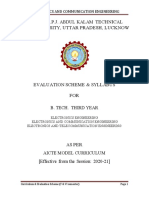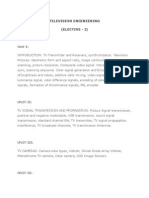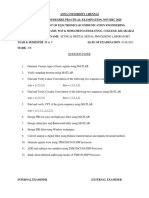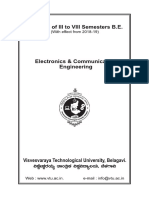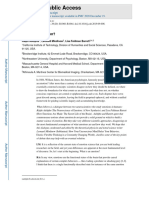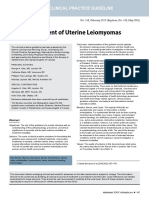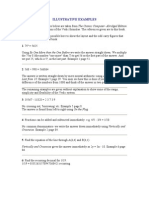0 ratings0% found this document useful (0 votes)
329 views21EC72_Question Bank-2
most asked questions
Uploaded by
NIKITH KRISHNA G 2021EC086Copyright
© © All Rights Reserved
Available Formats
Download as PDF, TXT or read online on Scribd
0 ratings0% found this document useful (0 votes)
329 views21EC72_Question Bank-2
most asked questions
Uploaded by
NIKITH KRISHNA G 2021EC086Copyright
© © All Rights Reserved
Available Formats
Download as PDF, TXT or read online on Scribd
You are on page 1/ 2
CAMBRIDGE INSTITUTE OF TECHNOLOGY
K.R. PURAM, BANGALORE – 560 036,
Affiliated to VTU, Belagavi| Approved by AICTE, New Delhi| NAAC& NBA Accredited|
UGC 2(f) Certified| Recognized by Govt. of Karnataka
Department of ECE
Question Bank-2
Course: Optical & Wireless Communication Semester: VII
Course Code: 21EC72 Date: 13/11/2024
Q NO. QUESTIONS CO RBT MARKS
1 With the help of a diagram, explain the principle of WDM. CO2 L2 10M
2 Draw and explain the operation and design of : CO2
i) Optical isolators
ii) Optical Circulators
3 Explain Fiber Grating Filters. CO2 L2 10M
4 Describe in brief the concept of demultiplexing function using a fiber CO2 L2 10M
grating and an optical circulator.
5 Describe in brief the operation of Dielectric Thin-Film Filters CO2 L2 10M
6 Describe in brief the concept of multiplexing function using a fiber CO2
grating and an optical circulator.
7 Explain Diffraction Gratings with an example CO2 L2 10M
8 Explain the 1G Analog Cellular system CO3 L2 10M
9 Explain the 2G Analog Cellular system CO3 L2 10M
10 Explain the 3G Analog Cellular system CO3 L2 10M
11 List out the 3G cellular network capabilities CO3 L2 10M
12 List and explain the services offered by 3G Cellular Networks CO3 L3 10M
13 Compare 1G, 2G, 3G, 4G and 5 G wireless communications CO3 L2 10M
14 In brief Explain the basic signal propagation Mechanisms CO3 L2 10M
15 what do you mean by Fading and Multipath fading CO3 L3 10M
16 List and Eplain the types of small scale Fadings CO3 L2 10M
17 Explain the multipath delay spread CO3 L2 10M
18 Explain the cellular Terminologies CO3 L2 10M
email: iqac@cambridge.edu.in Website: www.cambridge.edu.in Page 1
CAMBRIDGE INSTITUTE OF TECHNOLOGY
K.R. PURAM, BANGALORE – 560 036,
Affiliated to VTU, Belagavi| Approved by AICTE, New Delhi| NAAC& NBA Accredited|
UGC 2(f) Certified| Recognized by Govt. of Karnataka
Department of ECE
19 Explain the cell structure and Cluster CO3 L2 10M
20 Example 1 CO3 L3 10M
Consider a single high-power transmitter that can support 40 voice
channels over an area of 140 km² with the available spectrum. If this
area is equally divided into seven smaller areas (cells), each supported
by lower power transmitters so that each cell supports 30% of the
channels, then determine
(a) Coverage area of each cell
(b) Total number of voice channels available in cellular system
Comment on the results obtained.
21 Calculate the number of times the cluster of size 4 have to be replicated CO3 L2 10M
in order to approximately cover the entire service area of 1765 km2
with the adequate number of uniform-sized cells of 7 km2 each
22 Explain frequency Reuse concept CO3 L3 10M
23 Explain Cluster size and System capacity CO3 L2 10M
24 Explain Frequency Reuse Distance CO3 L2 10M
Prepared by
Prof. Veerappa Chikkagoudar
email: iqac@cambridge.edu.in Website: www.cambridge.edu.in Page 2
You might also like
- Speech PROCESSING NOTES 8TH SEM VTU Module3100% (1)Speech PROCESSING NOTES 8TH SEM VTU Module326 pages
- Technological Innovation Management and Entrepreneurship: Model Question Paper - With Effect From 2020-21 (CBCS Scheme)No ratings yetTechnological Innovation Management and Entrepreneurship: Model Question Paper - With Effect From 2020-21 (CBCS Scheme)7 pages
- Satellite Communications Question Bank SUB CODE:18EC732No ratings yetSatellite Communications Question Bank SUB CODE:18EC7322 pages
- Part - B Unit - 5 Multimedia Information Networks Introduction, Lans, Ethernet, Token Ring, Bridges, Fddi High-Speed Lans, Lan Protocol. 7 HoursNo ratings yetPart - B Unit - 5 Multimedia Information Networks Introduction, Lans, Ethernet, Token Ring, Bridges, Fddi High-Speed Lans, Lan Protocol. 7 Hours33 pages
- (D) Unit-I: Mapping of CO's With PO's/PSO's: Department of Electronics and Communication EngineeringNo ratings yet(D) Unit-I: Mapping of CO's With PO's/PSO's: Department of Electronics and Communication Engineering1 page
- MANUAL COMMUNICATION LAB-II, KEC-651,2020-21, Even SemNo ratings yetMANUAL COMMUNICATION LAB-II, KEC-651,2020-21, Even Sem18 pages
- Network Analysis & Synthesis Lab Manual NEC-351: Department of Electronics and Communication EngineeringNo ratings yetNetwork Analysis & Synthesis Lab Manual NEC-351: Department of Electronics and Communication Engineering18 pages
- VTU Question Paper of 17EC36 Engineering Electromagnetics Aug-2021No ratings yetVTU Question Paper of 17EC36 Engineering Electromagnetics Aug-20212 pages
- Active Structural Control: Abstract This Chapter Provides An Overview of Building Structure Modeling andNo ratings yetActive Structural Control: Abstract This Chapter Provides An Overview of Building Structure Modeling and37 pages
- Fm/Am Compact Disc Player: CDX-G1280UM/CDX-G1201U/CDX-G1200U/ CXS-G1269U/CXS-G124SU/CXS-G1216UNo ratings yetFm/Am Compact Disc Player: CDX-G1280UM/CDX-G1201U/CDX-G1200U/ CXS-G1269U/CXS-G124SU/CXS-G1216U56 pages
- Mark Hyman - The Young Forever Cookbook (2024) - Libgen - LiNo ratings yetMark Hyman - The Young Forever Cookbook (2024) - Libgen - Li332 pages
- What Is An Emotion A Debate Adolphs and Lisa F Barret 2020No ratings yetWhat Is An Emotion A Debate Adolphs and Lisa F Barret 202010 pages
- Stephanie Paladino (Editor), Shirley J Fiske (Editor) - The Carbon Fix - Forest Carbon, Social Justice, and Environmental Governance-Routledge (2016)No ratings yetStephanie Paladino (Editor), Shirley J Fiske (Editor) - The Carbon Fix - Forest Carbon, Social Justice, and Environmental Governance-Routledge (2016)356 pages
- Commonlit They-Re-Made-Out-Of-Meat StudentNo ratings yetCommonlit They-Re-Made-Out-Of-Meat Student7 pages
- Illustrative Examples of Vedic MathematicsNo ratings yetIllustrative Examples of Vedic Mathematics3 pages
- Mater PIR - Dr. Siti Chandra W., SP - KFR-K High Intensity Laser For Post COVID Rehabilitation100% (1)Mater PIR - Dr. Siti Chandra W., SP - KFR-K High Intensity Laser For Post COVID Rehabilitation20 pages




































